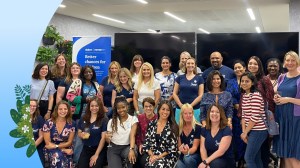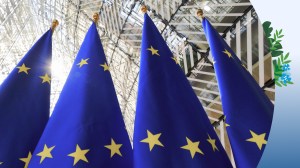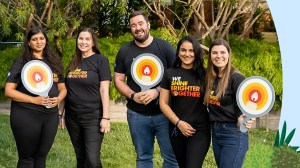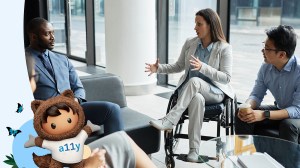Our Progress So Far on Racial Equality and Justice — Reflecting During Black History Month
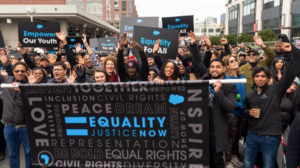



Salesforce Racial Equality and Justice Taskforce
Editor’s Note: This post was updated on February 19 to reflect the correct figure at the time for URM attrition.
February is Black History Month — a time to honor the largely untold history of the Black community while also taking action to build Black futures. An important part of this is carrying forward the legacy of those who fought before us to reach true racial equality and justice. Last year we endured a global pandemic that revealed some of society’s deepest inequalities, while at the same time facing a reckoning of racial injustice, violence, and hate that has persisted for far too long.
In the words of Dr. Martin Luther King, Jr. — “out of a mountain of despair, a stone of hope.” — we saw that in the midst of the darkness, the light became the way that people around the globe began to speak up and show up for racial equality. The conversations seemed to move past whether or not there was a problem — to how do we collectively solve the problem and create a better world.
As a company, industry, and business community we were called to act. Led by our values, we formed the Racial Equality and Justice Task Force to help drive systemic change in our workplace and community across four P’s — people, purchasing, philanthropy ,and policy. Our task force — led by some of our most senior executives and made up of employees at every level including leaders from our Black employee resource group — went right to work. We deeply listened to the communities impacted, we set goals and metrics to track success, we committed funding to the work, we stood up new programs and processes, and we empowered leaders to drive change.
Though we know there is much more work ahead, it is encouraging to see how much has been accomplished in six months — truly demonstrating the power of community, intention, inclusion, and direct action. We are incredibly grateful for our employees who dedicated their time and energy to this important work and to all those around us who continue to inspire and lead the change. This work is ongoing, here is a look at our progress so far:
People
We are intentional about building an equitable workplace that looks like society and where everyone can succeed.
Goal: Double U.S. Representation of Black Leaders and Increase U.S. Representation of Underrepresented Minority (Black, Latinx, Indigenous, Multi-racial) employees and leaders by 50% by 2023.

- Over the last year, U.S. representation of Black leaders has increased by more than 50% — albeit off of a small base. Overall U.S. Black representation is up from 2.9% in 2019 to 3.4%
- As noted in our most recent quarterly update, over the past year, our percentage rate of URM hiring is up more than 40%. We saw our greatest increase in Black hiring representation. In January 2020, Black candidates made up 3.9% of hires vs. 7.2% as of January 2021.
- As reported in our end of year company update, URM attrition was down 27% year over year. That said, we need to more fully understand the possible impact of the current health crisis on this trend.
- Launched our first-ever Diversity Recruiting and Sourcing Team and URM referral program resulting in more than 250 hires to date. Piloted first-ever Inclusive Hiring recruiter and interviewer training for over 1,000 participants.
- Hosted a Racial Equality Ally Training for almost 7,000 employees, and also conducted Inclusive Promotions Training that addressed bias and microaggressions for over 6,000 managers and ESBPs.
- Launched the Warmline, an employee advocacy program for URM and women employees. To date, we’ve had more than 200 cases to date. The Warmline enables employees to have confidential conversations with advocates focused on belonging, equity, and career navigation.
- Expanded our URM development program in partnership with the Executive Leadership Council, including our first-ever manager learning sessions for more than 200 participants and our Tableau colleagues. Scaled our Equality Mentorship Program for employees of color to include 600+ participants including our Tableau colleagues.
Read more in our Annual Equality Update.
Philanthropy
We support organizations driving real, long-term change within the communities.
Goal: $200 million and 1 million volunteer hours committed to organizations driving racial equality and justice over the next five years.

Hamilton Families, a Salesforce Foundation grantee. Photo by Robin Hultgren.
- Drove nearly $23M in donations to advance economic opportunity, increase civic engagement, and promote systems change and resilience among Black, Latinx, and Indigenous communities. This included supporting organizations such as the Robin Hood Foundation Power Fund, Go Paladin, Talk Tech Association, Mission Asset Fund, and PolicyLink among others. Learn more about our strategy and what’s driving this work here.
- Donated $20M to five U.S. public school districts, empowering them to provide equitable, safe, and connected learning from anywhere.
- Provided $10,000 grants to 180 San Francisco small businesses to extend support in light of COVID-19. By partnering with the San Francisco African American Chamber and others, we gave grants to a diverse group of business owners and communities, including 50% women, 22% Black, 30% Latinx, and 13% LGBTQIA business owners. Learn more.
- Delivered over 80,000 racial equality and justice-related employee volunteer hours and launched a new volunteering partnership with the National Urban League.
- Supported the launch and scaling of a pilot program to address food insecurity in partnership with Eat. Learn. Play, Oakland Unified School District, World Central Kitchen, and others, delivering nearly 500,000 pounds of farm-fresh produce from local, minority-owned farms and serving more than 32,000 mostly (85%) Black and Latinx low-income families.
- Tableau Foundation invested $5.4 million to date in grants to 22 equity focused nonprofits who are using data to highlight systemic inequities and shape policy proposals for change. These grants combined software, training and financial support to these organizations, including new three-year partnerships with: PolicyLink, Urban Institute and the DC Fiscal Policy Institute, Measures for Justice and the Association of Prosecuting Attorneys , and Urban Institute and Georgetown University .
Purchasing
We empower Black, Latinx, and Indigenous businesses and entrepreneurs to close the racial wealth gap.
Goal: $100 million committed to Black-owned businesses and $100 million committed to Underrepresented Minority founders through Salesforce ventures over the next five years.

L-R: Safiya Miller, founder of SAFIYA MILLER, Rod Benson, founder of Rod Benson Art, Danielle Leslie, founder of Culture Add™ Labs, Walé Forrester, CEO and co-founder, Hustle Clean, Dr. Kari Williams, owner of Mahogany Hair Revolution, Cliff Worley, Digital Marketing Expert
- Spent $135 million with minority-owned businesses to date with significant spend increases with Black-owned businesses expected in Q4 FY21 and throughout FY22
- Ensured that all bid proposals and contract terms include terms that require our suppliers to engage URM suppliers in their procurement efforts.
- Established payment terms for 340 small businesses that reduced the processing time for payment by 30 days, positively impacting their cash flow and ability to pay expenses and develop new business.
- Over the last year, Salesforce Ventures doubled the number of companies in its portfolio led by Black and LatinX founders including innovative leaders such as Donnel Baird of BlocPower, Melissa Bradley of Ureeka and Abner Mason of ConsejoSano.
- Salesforce Ventures continued to invest in companies that break down systemic barriers such as Flockjay, an online academy that trains and re-skills job seekers from non-traditional and underrepresented backgrounds for future-proof jobs in tech sales, significantly increasing their income in 12 weeks.
- The Black Venture Institute, co-founded by Salesforce Ventures, alongside BLCK VC and Operator Collective, was launched to increase the number of Black check writers in venture capital by 5x in three years. The program hosted its first cohort of 50 operators last fall and the second cohort takes place in April 2021. You can express interest here.
Policy
We use our platforms to help drive systemic change at every level of society.
Goal: Advocate for police reform, civic engagement, and economic empowerment policies

Salesforce BOLDforce Atlanta members volunteering at a polling location, Georgia
- Advocacy in Action: Guided by our policy platforms, we set a foundation of sharing our positions at the federal level, and we successfully advocated for three police reform initiatives in both California and Indianapolis which are now law. We also continued our support for meaningful hate crimes legislation – including assisting with corporate coalition building, advocating for the successful passage of a law in Georgia.
- Establishing Policy Platforms: The Task Force Policy Committee established our policy recommendations on police reform, criminal justice reform, protecting and expanding voting rights. These platforms provide a roadmap for our education and advocacy efforts across the country.
- Protecting and Expanding Voting Rights: We hosted a three-part employee speaker series, “Voting in the U.S.” including an event dedicated to expanding and protecting voting rights. We joined a coalition op-ed to encourage Indiana to allow no-fault mail-in absentee voting for the November 3, 2020 election.
- Civic Engagement: We continued our partnership with the non-partisan TurboVote, providing employees with text and email reminders about voting deadlines and resources. This year, we announced the ability for employees to work as non-partisan poll workers on election day, and to count it towards Volunteer Time Off (VTO). Nearly 700 employees signed up to volunteer as poll workers across 33 states for the November 3, 2020 election. We hosted employee forums with candidates for office and even launched the public Civic Engagement in the US module on Trailhead. Learn more here about our programs and read about two employees who went above and beyond here.
We will continue to use our company as a platform for change and to inspire others to advance racial equality and justice. At Salesforce, we are committed to this journey through our various programs and initiatives, learn more: Salesforce.com/REJ

